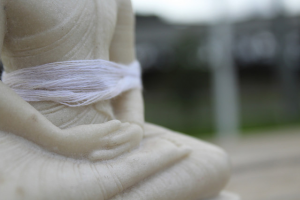 Not eating is a very potent form of medicine. Recent studies underline the positive influences traditional fasting has on our body and psyche. It helps with stress reduction, high blood pressure, diabetes and many other chronic or even acute conditions. Weight loss and clarity of mind are only two of its benefits. Our organism reduces fat, promotes the renewal of cells and regenerates during fasting. Our thinking becomes clearer. The truth is, we can easily and safely incorporate fasting into our daily life – if we want to.
Not eating is a very potent form of medicine. Recent studies underline the positive influences traditional fasting has on our body and psyche. It helps with stress reduction, high blood pressure, diabetes and many other chronic or even acute conditions. Weight loss and clarity of mind are only two of its benefits. Our organism reduces fat, promotes the renewal of cells and regenerates during fasting. Our thinking becomes clearer. The truth is, we can easily and safely incorporate fasting into our daily life – if we want to.
I have practised fasting for many years and always found the benefits surprising. Coming from a homeopathic viewpoint I could observe that the results were curative and non-suppressive – one of my main objectives when working with clients.
When the subject of fasting gradually entered the popular consciousness over the past years on television and social media, I noticed that many people seem to mistake the idea of fasting with ‘going on a diet’. The truth is, the two concepts couldn’t be further apart.
A word about dieting… we all can remember the numerous fad diets in glossy magazines. They don’t really work, you put the weight back on afterwards and sometimes they are even harmful, to your body and self image. You concentrate on the food but not on yourself.
Fasting is the voluntary renunciation of food and nutrients. The astonishing effects this has on body, mind and spirit are well known throughout all traditional forms of medicines and cultures. Periods of fasting were part of all world religions and of course also shamanism. Fasting was the spiritual ritual to get closer to yourself and to God. It’s the therapy of purification.
Mohammed fasted before the Koran was delivered to him, Moses climbed Mount Sinai and fasted for forty days, Jesus spent forty days in the desert to clear his head and heart and the Buddha went through such a prolonged period of fasting that it almost cost him his life – but it brought to him the realisation of the ‘golden middle way’.
You don’t need to be religious to engage in fasting, just smart!
Medical fasting has been popular in certain circles and times throughout the 20th century. The benefits are crystal clear, it is not harmful and it’s so cheap to do. It seems puzzling that mainstream medicine has not used it in an extensive way. My work is based on integral philosophy and coming from this way of holistic thinking I am wondering if it has something to do with the fact that by practising fasting, the responsibility is placed into the hands of the patient – you have to do it, fasting demands that you listen to yourself and to your body and mind. This contradicts the current model of medicine, where the emphasis lies in taking the responsibility away from the patient – giving the patient the idea that the medication will solve all their problems.
In my model of finding your path back to intrinsic health, the emphasis lies always in empowering yourself. I would like you to get in touch with the signs your body and mind send out. You can train your ability to understand the language of your body and respect it as a friend full of insight and possibility.
Don’t just believe me, try it out and see if it works for you!
While fasting you will literally make the space for such conversations to happen. That is just one aspect among all the other obvious benefits!
Fasting is a beautiful gift given to us by nature. Why not use it?
